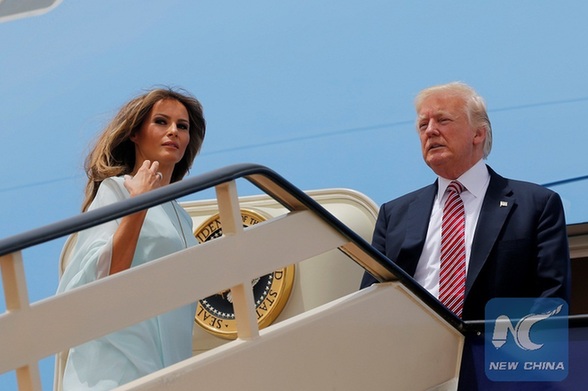Tran-Atlantic rift that took a while to develop
- By Sumantra Maitra
 0 Comment(s)
0 Comment(s) Print
Print E-mail China.org.cn, June 8, 2017
E-mail China.org.cn, June 8, 2017
|
|
|
U.S. President Donald Trump and first lady Melania Trump board Air Force One to depart for Israel from King Khalid International Airport in Riyadh, Saudi Arabia May 22, 2017. [Xinhua file photo] |
Apparently, Donald Trump had a successful Saudi Arabia tour, selling a lot of expensive heavy weaponry that will never be used against any genuine counter-insurgency operations but for a meaningless ego-boosting war in Yemen killing hundreds of thousands.
Then he landed in Europe and lectured Europeans on NATO spending. The intelligentsia exploded, wondering if this is the end of the Atlantic alliance.
German Chancellor Angela Merkel gave the same message to her people, symbolically in a beer hall, that Germany cannot depend on the U.K. and the U.S. anymore. Europeans must rely on themselves. On the other side of the Atlantic, there was a sense of palpable panic, as almost the entire liberal order appeared to have come crashing down in a German beer hall.
Needless to say, none of this is not strictly true. The fundamental questions were not actually raised. First of all, is NATO needed, and, if so, does it need to retain the original shape and size? Second and more importantly, was this rift inevitable and, if so, why?
NATO was formed as a balancing coalition over 70 years back by a handful of Western European countries and the United States, and it managed to successfully maintain the balance and, thus, European peace.
Unfortunately, over time, more countries were added, especially as the Soviet Union collapsed. Countries completely opposite of each other in their social and political situations, and ideology. Naturally, the interests of the countries forming the alliance differed.
Added to that, NATO started acting less as a balancing alliance and more as a frontier organization, looking for demons to slay. That exacerbated the difference within the alliance. Lately, prominent Western international relations theorists have argued that NATO needs to be either disbanded, or at least remodeled.
However, that's not all. The question nobody wants to ask is whether the West is German or American-led. Because it increasingly seems like the two visions are incompatible. Kantian Germany is strictly focused on values and Hobbesian America is focused on interests. Germany prefers a global borderless liberal institutionalist utopia, America looks at the world from a perspective of narrow nationalist self-interest. And America is not alone in this.
Consider this fact: The last time Germany followed American diktats was before the Soviet Union collapsed, when Germany was yet to be reunified. Immediately after unification, Germany was opposed of intervening in the Balkans. In 2003, Germany, alongside France and Russia, objected (rightly in my opinion) to the invasion of Iraq. That, however, changed completely during Barack Obama's presidency, when Germany pressed on a reluctant America the idea of a Libyan intervention.
In between Germany opposed the U.S. with regard to the supply of Russian gas to Europe. First, it didn't follow, then it did; and then it refused to follow again and grumbled about Russian sanctions.
Again, Germany differed radically with its supposed allies with regards to Turkey becoming a member of NATO and the E.U., and didn't consult them about opening European borders to migrants. There were problems with Obama over the U.S. National Security Agency's approach to counter-terrorism and on NATO spending. Germany also joined the China-promoted Asian Infrastructure Investment Bank to Washington's great displeasure.
What has happened or will happen? The fact is that Germany and U.S. are two leaders of the Western Atlantic alliance, not the U.K., France, Poland nor anyone else in Europe. And, it's obvious they have radically differing visions and interests with regards to the future of Europe and America.
And if we consider the EU as a budding hegemon led by Germany, then, by definition, there will be conflicts of interest, whether it's on climate, or coercive trade, or even in future military alliances. This will happen, regardless of Trump or no Trump.
Therefore, there is much need to closely watch and prepare for how the German-American relationship shapes the Western world. And if one follows the sage advice of Thucydides, it won't be pretty.
Sumantra Maitra is a columnist with China.org.cn. For more information please visit:
http://m.keyanhelp.cn/opinion/SumantraMaitra.htm
Opinion articles reflect the views of their authors only, not necessarily those of China.org.cn.






